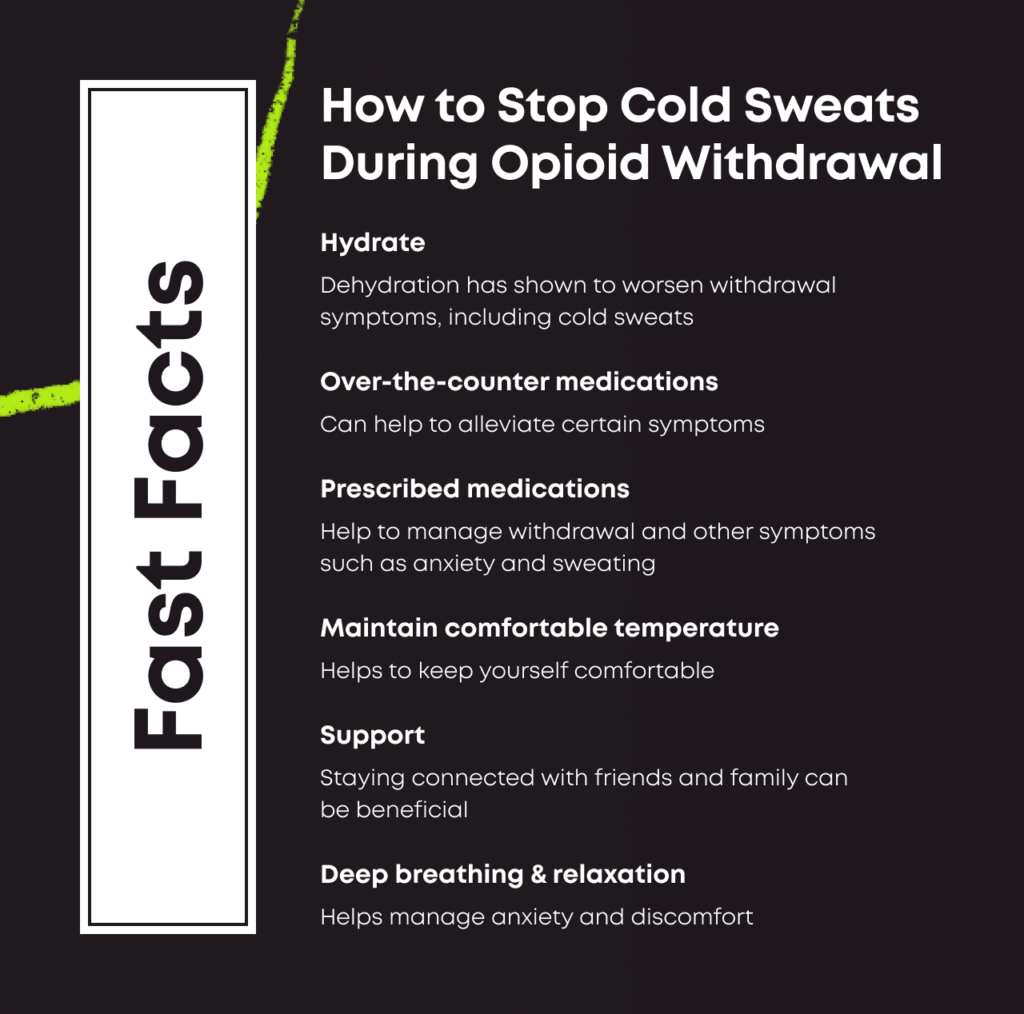Both pharmacologic and non-pharmacologic strategies can stop cold sweats from opiate withdrawal.
Cold sweats are common in people who abruptly stop taking opioids. Some people are so uncomfortable during withdrawal that they return to drug use as a result of the symptoms. For this reason, it is important to address the symptoms of withdrawal, including cold sweats, to help prevent people from returning to opioid use.

What Causes Cold Sweats During Opioid Withdrawal?
Each time you take an opioid, your brain releases dopamine. In time, your body becomes accustomed to this rush of dopamine. When you abruptly stop taking opioids, your body can experience a number of unpleasant symptoms including cold sweats.
While the withdrawal process is complex, researchers think sudden drug cessation leads to a condition called “adenylyl cyclase superactivation-based central excitation.”[1] As part of this process, enzymes that control the widening and contraction of your blood vessels are altered.[2] As your tissues are flooded and then deprived of blood, you experience hot and cold flashes. The heat makes you sweat, and when it stops, the air hitting your wet skin makes you cold.
Pharmacologic Treatments for Cold Sweats
If you’ve experienced withdrawal before, you may be willing to do almost anything to avoid a repeat performance. Some people keep misusing drugs indefinitely as they can’t stand withdrawal discomfort.[3] Know that you can get help to feel better.
Medications like clonidine can ease your withdrawal symptoms.[4] Clonidine is a alpha-blocker medication that decreases vasomotor symptoms like sweating and shaking. Clonidine is a good adjunctive medication for the symptoms of opioid withdrawal. However, the best medications to prevent cold sweats and withdrawal symptoms more generally are still the FDA approved medications for OUD: Methadone and Suboxone.
Non-pharmacological Remedies for Cold Sweats
There are other non-medication/non-pharmacologic treatments for cold sweats, including:
- Layers: Put on more clothing when you’re cold, and remove it when you feel hot.
- Laundry: If your clothes or sheets are wet, swap them out for fresh versions.
- Hydration: Warm fluids can alleviate your chills, and staying hydrated can keep your blood flowing.
- Meditation/Relaxation Practices: Meditating, deep breathing, guided imagery, and other relaxation techniques can be extremely helpful in managing tremors and sweats.
Know that your cold sweats are part of the withdrawal process.[5] They can be extremely unpleasant, but are not dangerous or life threatening. Reminding yourself of this fact could help you feel less stressed and worried during withdrawal.
If you are going through withdrawal and experience cold sweats or other symptoms, Suboxone and/or other MAT options are the best and most evidence based treatments. Reach out to your doctor to learn more about these treatment options.
Sources
- Opioid Withdrawal. StatPearls. https://www.ncbi.nlm.nih.gov/books/NBK526012/. March 2022. Accessed July 2022.
- Adenylyl Cyclases. Basic Neurochemistry: Molecular, Cellular, and Medical Aspects. https://www.ncbi.nlm.nih.gov/books/NBK27958/. 1999. Accessed July 2022.
- Therapies and Mechanisms of Opioid Withdrawal. Future Medicine. https://www.futuremedicine.com/doi/10.2217/pmt-2017-0028. November 2017. Accessed July 2022.
- Opioid Withdrawal Symptoms, a Consequence of Chronic Opioid Use and Opioid Use Disorder: Current Understanding and Approaches to Management. Journal of Clinical Pharmacy and Therapeutics. https://onlinelibrary.wiley.com/doi/full/10.1111/jcpt.13114. January 2020. Accessed July 2022.
- The Neurobiology of Opioid Dependence: Implications for Treatment. Addiction Science and Clinical Practice. https://www.ncbi.nlm.nih.gov/pmc/articles/PMC2851054/. July 2002. Accessed July 2022.

Medically Reviewed By Elena Hill, MD, MPH
Elena Hill, MD; MPH received her MD and Masters of Public Health degrees at Tufts Medical School and completed her family medicine residency at Boston Medical Center. She is currently an attending physician at Bronxcare Health Systems in the Bronx, NY where ... Read More
Download Our Free Program Guide
Learn about our program, its effectiveness and what to expect
Related Content
Imagine what’s possible on the other side of opioid use disorder.
Our science-backed approach boasts 95% of patients reporting no withdrawal symptoms at 7 days. We can help you achieve easier days and a happier future.